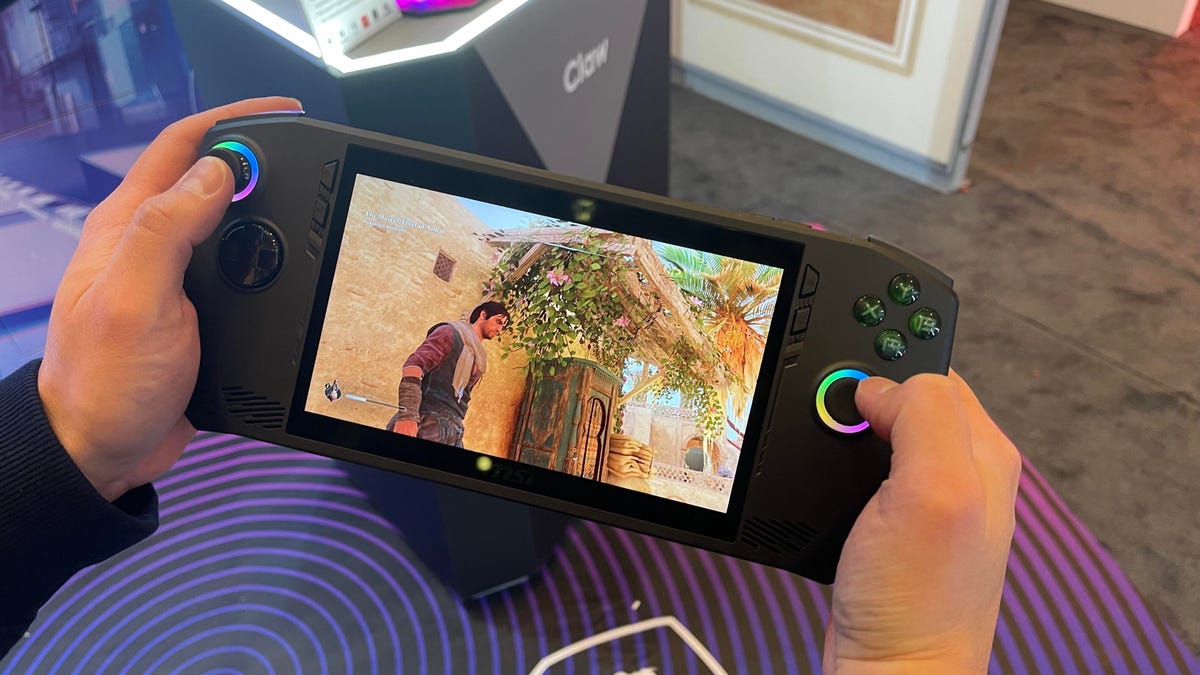New PC Handheld MSI Claw Shows the Future of Portable Gaming
MSI's new competitor to the Steam Deck shows how Intel chips could make an impact in PC handheld gaming. We go hands-on at CES 2024.

MSI's Claw is one of the most powerful handheld game consoles yet.
The success of Valve's Steam Deck has already inspired similar PC gaming handhelds like the Asus ROG Ally and Lenovo Legion Go, but competition is heating up. Announced at CES 2024 this week, a new PC gaming device from MSI called the Claw that uses an Intel processor could be one of the most powerful portable PC gaming devices yet.
The MSI Claw looks very much like the Steam Deck or the Asus ROG Ally handheld, but has specs that appear to be a cut above: an Intel Core Ultra 5 or 7 processor with Intel Arc graphics (the latest Meteor Lake chip technology); 16GB of RAM; a 7-inch, 1,920x1,080-pixel, 120Hz IPS display; 512GB or 1TB of storage; Wi-Fi 7 and Bluetooth 5.4. There's also a Thunderbolt 4 USB-C port, a microSD card slot and a power button with a fingerprint reader.
Prices start at $699 for a Core Ultra 5 and a 512GB solid-state drive and go up $50 for a Core 7 Ultra and another $50 for an Ultra 7 and a 1TB SSD. It's expected to be available in February or March.
Like the Lenovo and Asus devices, this handheld runs Windows 11. There's a 53-watt-hour battery onboard, with battery life at full performance mode estimated to be around two hours. All that adds up: This beefy handheld weighs 675 grams (nearly 1.5 pounds).
The Claw has Thunderbolt USB-C, an SD card slot and a substantial cooling vent on the top edge.
I haven't played anything on the MSI Claw yet, but my colleague David Katzmaier did -- watch his video above. Here's what he says about his brief hands-on time:
The Claw felt solid to play, although the main triggers and analog sticks didn't have quite the same level of heft as something like a PS5 controller, and I didn't love the shoulder trigger ridges. The large LCD screen was bright and clear but obviously not as vibrant as OLED. Despite the console's size, it didn't feel overly bulky to me. Like any handheld console, however, I could see it becoming a heavy lift during a longer gaming session.
I played only a few minutes of one game, Assassin's Creed Mirage. The graphics looked sharp and gameplay was mostly smooth. At one point after some extended running through town, it got choppy and stuttered a few times, but when I stopped running it became smooth again. MSI's rep said that the company was still tweaking the unit's software.
What the Claw symbolizes may be even more important than what it does. Intel is joining the party on new handheld-ready gaming chips, which suggests that hardware manufacturers should be even more able to create Steam Deck-like handhelds running Windows.
I still love the Steam Deck, especially the new OLED model. Microsoft likely needs to help optimize game handhelds to work even better as manufacturers make more Windows-running Steam Deck-alikes. But at this point, I'd expect this to just be the beginning of where PC handheld gaming is going. The MSI Claw looks familiar, but in a very good way.
For more coverage of CES 2024, take a look at our favorite products from CES so far, and check out the coolest AI tech we've seen at the electronics show.

